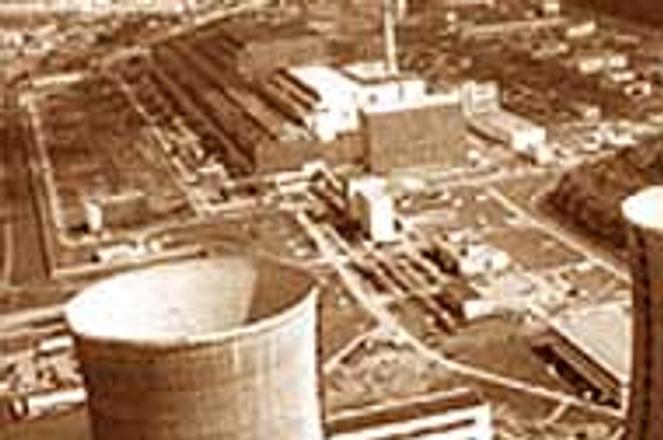Nuclear-free Austria threatened to block Slovak EU entrance.photo: Courtesy Mochovce
For Prime Minister Mikuláš Dzurinda, who said on January 1 that the Slovak government wanted to "jump on the train of European integration," 1999 was a highly satisfying year. Slovakia took significant strides towards joining western bodies, and was far better received internationally than observers had expected at the beginning of the year.
But the going was not always smooth. Slovakia's broken promise to close the Jaslovské Bohunice nuclear power plant by the year 2000 resulted in a drawn-out battle of words with neighbouring Austria, who threatened to block the country's EU ambitions.
Furthermore, Slovakia's decision to allow NATO troops access to its airspace and railways during the NATO bombing campaign in Kosovo split the nation and weakened domestic support for NATO integration.
But the year ultimately ended on a high note: 1999 will go down in Slovak history as the year in which the country went from the status of an international pariah to that of an official invitee to begin entrance negotations with the European Union.
The long road began on January 22 when the EU-Slovak Joint Parliamentary Committee announced that Slovakia had successfully fulfilled committee recommendations since the September 1998 national elections.
While praising the country's efforts, the committee added that Slovakia still had 23 tasks to accomplish, including dealing with the Roma issue, passing a new language law and continuing to take economic austerity measures.
The positive signals, however, were not enough to make up for several years of international isolation, and Slovakia could only watch enviously from the sidelines as its Visegrad 4 country mates (Poland, Hungary and the Czech Republic) joined NATO on March 12. NATO had excluded Slovakia from the enlargement process in 1997 because of the country's failure to apply democratic principles under the former Vladimír Mečiar government.
"We are a little sad to see where Slovakia could have been had we just pursued a policy of common sense and decency," said Defence Minister Pavol Kanis.
But when NATO began its bombing campaign in Kosovo later that month, many Slovaks were relieved that the country would not be involved in a war against a fellow Slavic country. Indeed, given the sympathies many Slovaks felt for the Serbs, the government's March 25 decision to allow NATO warplanes access to the country's airspace on their way to bombing assignments in Yugoslavia was not well-received.
At the outset of the year, a little over half of the country supported NATO entrance. According to Ivo Samson, an analyst with the Slovak Foreign Policy Association, the bombing cost the government significant public support in joining western structures. "Today, the greater part of society has strong anti-western feelings," he said. Polls taken after the Kosovo crisis showed that fully 56% of Slovaks were against NATO entrance while 34% were in favour; by December, this ratio had improved somewhat to 41% for and 46% against.
A rancorous squabble between Slovakia and Austria began on April 26. Thirteen years to the day after the Chernobyl nuclear catastrophe, the Slovak government announced that it would not keep its 1994 promise to shut down the Russian-designed Bohunice nuclear power plant by the year 2000. Austrian officials said in response it would be "impossible" for them to support Slovakia in its bid to enter the EU.
Over the following months, as Slovakia agreed to shut down Bohunice between 2006 and 2008, other European nations weighed in on Slovakia's behalf, and when Foreign Minister Eduard Kukan in early December offered to negotiate an earlier closure with his Austrian counterpart, the latter agreed not to oppose Slovakia's EU bid at the Helsinki summit.
The government scored a diplomatic coup on April 28 when United Nations Secretary-General Kofi Annan appointed Kukan as one of two special envoys to be sent to Kosovo to find a diplomatic resolution to the conflict.
The country's warming relations with the West also led to a series of meetings with high-ranking US officials. Dzurinda met with US President Bill Clinton September 21 in Washington to discuss Slovakia's NATO readiness, while both Hillary Clinton and Secretary of State Madeleine Albright visited Slovakia, on October 4 and November 22 respectively, in a show of further support.
The pivotal moment of recognition came on October 13 when the European Commission (EC) released a report recommending that all 15 EU countries support Slovakia's EU ambitions - the first time in Slovak history that such a strong endorsement had come from an EU executive body.
The report was happily received by Slovak officials, who promised that the country would intensify its efforts to satisfy all points of the 'Copenhagen criteria' - crucial political requirements for EU membership.
"This means success because this government did what Mečiar's wasn't able to," said Deputy Foreign Minister Ján Figeľ. "And it's an opportunity because now we know what we have to do if we want to join the family of European nations."
Slovakia faced another significant problem just before the Helsinki summit when Norway reinstated a visa requirement for Slovaks on December 7. Three countries - Norway, Finland and Denmark - began the visa regimes to help curb the influx of Roma asylum seekers fleeing Slovakia.
Foreign Minister Kukan said that three other countries were considering visas for Slovaks, but added that the issue would not effect the EU summit talks. While the Roma said that they were discriminated against in Slovakia, Norwegian and Danish officials said that the Roma claims were "unjustified."
In the end, the year was crowned with the December 11 and 12 Helsinki summit. Upon his return to Slovakia, PM Dzurinda said that the EU's invitation to open accession talks was "a historical milestone and a big chance for Slovakia."


